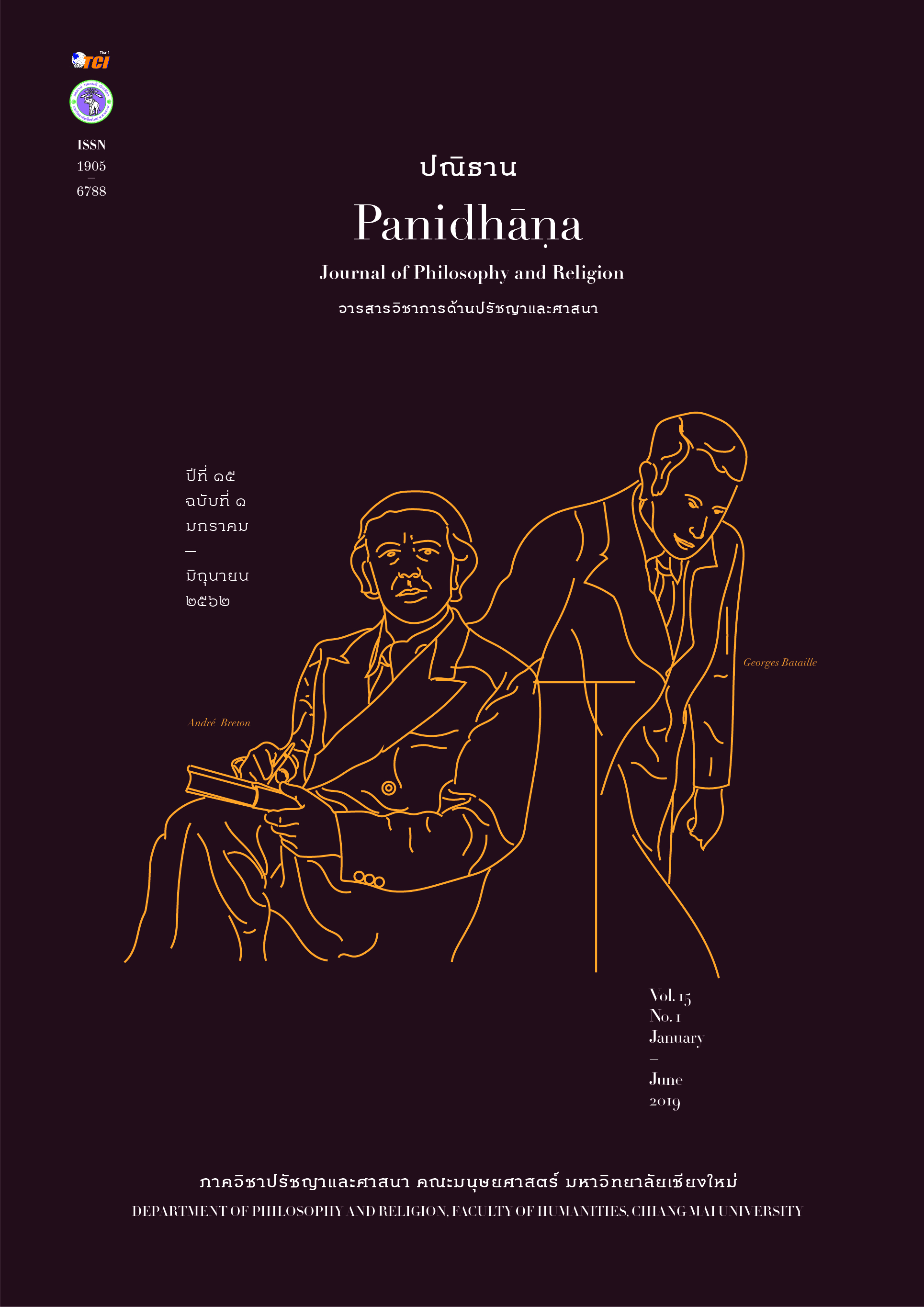แบบจำลองส่วนหน้าของการเตรียมความพร้อมในด้านอาชีพและนัยสำคัญที่มีต่อการเรียนรู้ตลอดชีวิต
คำสำคัญ:
แบบจำลองส่วนหน้า, ความสามารถเป็นที่จ้างงานได้, การเรียนรู้ตลอดชีวิตบทคัดย่อ
บทความวิจัยชิ้นนี้มีวัตถุประสงค์เพื่อถกเถียงกับแนวเหตุผลของพอล แฮเกอร์และบรรดานักทฤษฎีการศึกษาที่โต้แย้งแบบจำลองส่วนหน้าของการศึกษา แบบจำลองดังกล่าวถูกโต้แย้งว่าไม่อาจประสบความสำเร็จได้จริงในการเตรียมความพร้อมในด้านอาชีพ และนักวิจารณ์เหล่านั้นชี้ว่าเป็นแบบจำลองที่ตั้งอยู่บนฐานคิดเชิงการตีความที่ผิดซึ่งจะไม่เอื้อกับการเรียนรู้ตลอดชีวิตในระยะยาว ฐานคิดที่ได้รับการโต้แย้งนั้นก็คือการแยกแยะมโนทัศน์ของกระบวนการและผลิตภัณฑ์อย่างชัดเจน ฝ่ายโต้แย้งให้เหตุผลว่าไม่อาจมีความแยกเด็ดขาดจากกันเช่นนั้นได้จริง จากการวิจัย มีข้อวิเคราะห์หลายประการบ่งชี้ว่าแบบจำลองส่วนหน้ามีแง่มุมที่สำคัญยิ่งต่อการจ้างงานและอาชีวศึกษา ได้แก่ ความเชื่อที่ว่าการฝึกปฏิบัติจริงขณะปฏิบัติงานนั้นจะรับรองทักษะของผู้เรียนก่อนเข้าสู่การปฏิบัติงานจริง ผู้วิจัยอาศัยแนวทางการวิเคราะห์แบบปรัชญาหลังนวยุคแล้วพบว่าความสัมพันธ์ระหว่างการศึกษาและการทำงานเป็นความสัมพันธ์ที่ซับซ้อนอย่างสูงยิ่ง ผลของความซับซ้อนนี้ทำให้แฮเกอร์และเพื่อนร่วมงานไม่อาจมีเหตุผลที่สมบูรณ์พอที่จะหักล้างนัยสำคัญของแบบจำลองส่วนหน้าได้ดังที่พวกเขาชี้ไว้ในงานวิจัยก่อนหน้า ในทางตรงกันข้าม ผู้วิจัยให้ข้อโต้แย้งว่าเราจะมีน้ำหนักในทางเหตุผลมากกว่าที่จะชี้ว่านโยบายใหม่ของการเรียนรู้ตลอดชีวิตยังต้องอาศัยการตีความใหม่ต่อความบริบูรณ์ของแบบจำลองส่วนหน้าของการเตรียมความพร้อมในด้านอาชีพ ทั้งนี้ นิยามการเป็นมนุษย์ที่มีน้ำหนักสมเหตุผลกว่าซึ่งได้จากฮันนาห์ อาเรนต์นั้นพบว่าเกี่ยวเนื่องกับงานและการทำงาน ผู้วิจัยชี้ว่าหากดำเนินแนวคิดในที่นี้ด้วยข้อโต้แย้งว่าด้วยความสามารถเป็นที่จ้างงานได้ซึ่งไม่สมบูรณ์แบบ จะพบว่าข้อโต้แย้งต่อแบบจำลองส่วนหน้าเองก็มีฐานคิดสำคัญที่ไม่เข้ากับนิยามเงื่อนไขการเป็นมนุษย์ดังกล่าว จึงพิจารณาได้ว่าข้อโต้แย้งต่อแบบจำลองส่วนหน้าเป็นข้อโต้แย้งที่ยังไม่มีน้ำหนักเหตุผลที่มากพอ
เอกสารอ้างอิง
Beckett, D. and Hager, P. (2002). Life, Work and Learning: Practice in Postmodernity. London: Routledge.
Dean, B. A. (2015). Learning on Placement: A Sociomaterial, Practice-Based Approach to Work-Integrated Learning. Doctor of Philosophy Thesis, School of Management, Operations and Marketing, University of Wollongong.
Grint, K. (2005). The Sociology of Work: An Introduction, third edition. Cambridge: Polity Press.
Hager, P. (1990). Vocational Education/General Education: A False Dichotomy. In Studies in Continuing Education 12(1): 13-23.
———. (1998). Recognition of Informal Learning: Challenges and Issues. In Journal of Vocational Education and Training 50(4): 521-535.
———. (2004). Conceptions of Learning and Understanding Learning at Work. In Studies in Continuing Education 26(1): 3-17.
———. (2007). Towards a New Paradigm of Vocational Learning. In L. Clarke and C. Winch (eds.), Vocational Education: International Approaches, Developments and Systems. pp. 105-117. London: Routledge.
———. (2008). Education at Work – Serious Possibility or Policy Naivety? In P. Gonon, K. Kraus, J. Oelkers, and S.
Stolz (eds.), Work, Education and Employability. pp. 21-54. Bern: Peter Lang.
Hager, P. and Hyland, T. (2003). Vocational Education and Training. In N. Blake, P. Smeyers, R. Smith, and P. Standish (eds.), The Blackwell Guide to the Philosophy of Education. pp. 271-287. Oxford: Blackwell.
Illeris, K. (2011). The Fundamentals of Workplace Learning: Understanding How People Learn in Working Life. London and New York: Routledge.
Jarvis, P. (2004). Adult Education and Lifelong Learning: Theory and Practice, third edition. London: RoutledgeFalmer.
Lindeman, M. A. (2006). Emerging Identities: Practice, Learning and Professional Development of Home and Community Care Assessment Staff. Doctor of Philosophy Thesis, Faculty of Education & School of Social Work, Faculty of Arts, The University of Melbourne.
Morley, D. A. (2018). The ‘Ebb and Flow’ of Student Learning on Placement. In D. A. Morley (ed.), Enhancing Employability in Higher Education through Work Based Learning. pp. 173-190. Cham: Palgrave Macmillan.
Ollis, T. A. (2010). Accidental and Lifelong Activists: Embodied Knowledge, Identity and Learning. Doctor of Philosophy Thesis, School of Education, Faculty of Arts, Education and Human Development, Victoria University.
Organisation for Economic Co-operation and Development (OECD). (1996). Lifelong Learning for All: Meeting of the Education Committee at Ministerial Level, 16-17 January 1996. Paris: OECD.
Papastephanou, M. (2013). Aristotelian Gnoseology and Work-Based Learning. In P. Gibbs, (ed.), Learning, Work and Practice: New Understandings. pp. 107-119. Dordrecht: Springer.
Simkins, T. (1976). Recurrent Education: Some Economic Issues. In Higher Education 5(4): 363-376.
White, J. (1997). Education and the End of Work: A New Philosophy of Work and Learning. London: Cassell.
Winch, C. (2006). Georg Kerschensteiner- Founding the Dual System in Germany. In Oxford Review of Education 32(3): 381-396.
ไฟล์ประกอบ
เผยแพร่แล้ว
รูปแบบการอ้างอิง
ฉบับ
ประเภทบทความ
สัญญาอนุญาต
เนื้อหาของบทความที่ได้รับการตีพิมพ์ในวารสารปณิธานถือเป็นลิขสิทธิ์ของวารสารปณิธาน ห้ามเผยแพร่ ตัดต่อ แก้ไข หรือนำไปใช้ก่อนได้รับอนุญาต
ผู้สนใจสามารถติดต่อขอเผยแพร่เนื้อหาในวารสารปณิธานได้ที่ panidhana-human@cmu.ac.th







